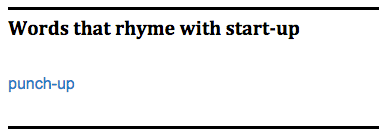Let’s start with the Oxford Dictionary definition of a startup:
NOUN
[MASS NOUN]
1. The action or process of setting something in motion:
the start-up of marketing in EuropeMORE EXAMPLE SENTENCES
1.1 [COUNT NOUN] A newly established business:
problems facing start-ups and small firms in rural areas
Whilst the definition is seemingly straightforward, there is the need to explore alternative definitions as there are many, many variations. Assuming you were to ask the founder/owner/entrepreneur who has started a ‘newly established business’ what the definition of a startup is, you would receive a multitude of answers. This would vary dependant on where in the world they are, what their ambitions are for the business and how innovative the business idea is among other factors.
So, with the above in mind, let’s explore some further definitions.
Steve Blank, author of ‘The Startup Owner’s Manual‘ and professor of Entrepreneurship at Stanford University (Blank’s actual bio is far too long for me to do him justice so check him out in more detail at his site www.steveblank.com – it’s great reading for all entrepreneurs) has suggested the following definition:
A startup is an organization formed to search for a repeatable and scalable business model
(Source: What’s A Startup? First Principles)
The crucial word to note in Blank’s definition is ‘search’. This suggests elements of the business that are unknown.
Next up, we have Eric Ries, author of ‘The Lean Startup‘. The Lean Startup is a book I recommend to anyone and everyone who is interested in startups. It covers hugely important principles that any entrepreneur should understand before they get started. Ries’ definition is as follows:
A startup is a human institution designed to deliver a new product or service under conditions of extreme uncertainty.
Just as Steve Blank stated that a startup is on a ‘search’, Eric reinforces this by stating that a startup is ‘under conditions of extreme uncertainty’. Notice how this theme wasn’t mentioned at all in the dictionary definition.
Moving on, we come to Y-Combinator founder, Paul Graham. Y-Combinator is an intensive, 3 month, startup program which has funded companies such as AirBnB, Dropbox and Stripe; all companies which have crossed the $1billion valuation mark. Paul has written a highly debated essay titled ‘Startups = Growth‘. The first paragraph from this essay reads:
A startup is a company designed to grow fast. Being newly founded does not in itself make a company a startup. Nor is it necessary for a startup to work on technology, or take venture funding, or have some sort of “exit.” The only essential thing is growth. Everything else we associate with startups follows from growth.
(Note: I highly recommend reading all of Paul Graham’s essays. They’re an incredibly insightful resource.)
What’s is interesting about this is that Graham directly disagrees with the Oxford definition that a startup is newly established. Stating that a startup is designed to grow fast aligns more with Blank’s definition where he states that the startup’s business model needs to be ‘repeatable’, yet Ries’ definition mentions nothing of the sort. You can begin to see where all the confusion stems from.
In a recent TechCrunch article titled ‘What the hell is a startup anyway?‘, journalist Alex Wilhelm tries to define a startup according some concrete milestones. He begins by explaining similarly to how I am about how many differing definitions there are and goes on to state “I think that we can instead rely on the 50, 100 or 500 rule, which I just made up.” The rule implies:
If your company has, or is any of the following, you have to hang up your Startup Uniform, and realize that you are just another technology company either hunting for or actively avoiding an IPO:
- $50 million revenue run rate (forward 12 months);
- 100 or more employees;
- Worth more than $500 million, on paper or otherwise.
It’s an interesting way of thinking about it and I don’t disagree with his point of view. At the very least it gives us a data driven framework on which to judge a company by.
However, by far and away my personal favourite definition comes from the often outspoken Dave McClure of 500 Startups.
A ‘startup’ is a company that is confused about —
- What its product is.
- Who its customers are.
- How to make money.
As soon as it figures out all 3 things, it ceases being a startup and becomes a real business.
Except most times, that doesn’t happen.
I think this definition best encapsulates what a startup is all about and as an entrepreneur I feel that it is a good framework for benchmarking your own progress with your company. It is also the only definition which addresses the unfortunate truth that in a majority of cases a startup fails to become a real business.
The observation from each of the definitions listed is that there is a consistent theme of ‘having to work stuff out’ along the way. When you’re in the trenches of a startup there is a constant feeling of this and sometimes there is the need to change things up and course correct, or as Ries calls it in the Lean Startup, choose to ‘pivot’. From observers on the outside this can often make it look like the startup is floundering, unsure of its direction or just taking a stab in the dark, when in reality it is more than likely ‘validated learning’ towards becoming less ‘confused’ about one Dave McClure’s 3 critical things a startup has to work out.
In conclusion, it’s fair to say that there isn’t a one size fits all definition. Every startup in different and perhaps it would be unrealistic to expect one umbrella definition to be applicable to all. I would however, suggest that there is a difference between “starting a business” and “starting a startup”. To take a few examples we could suggest that opening a bar, starting an accountancy firm, or launching a social media agency to name a few would not necessarily be ‘startups’. (Graham covers this point in his essay also). In each case there is not the level of uncertainty, search, or requirement to work things out as you go along. In each case, in theory, you would have most, if not all, of the areas of uncertainty figured out already.
Hence, working for or founding a startup is a rollercoaster of a ride, full of ups and downs with many pivots along the way. One thing amused me when writing this post; under the oxford dictionary definition it continues with “words that rhyme with startup”. Here is what I found:
Sometimes a startup feels like a punch-up. Sometimes you’re on top, sometimes you’re down, some startups unfortunately get knocked out. Gary Vaynerchuk has likened business to boxing. It’s a tough journey but an addictive journey and one that so many startup entrepreneurs just cannot resist.
If you’re working on your startup and reading this – keep up the good work and keep working it out.
Which is your favourite definition and have I missed any big ones? I’d love to hear your thoughts in the comments.

